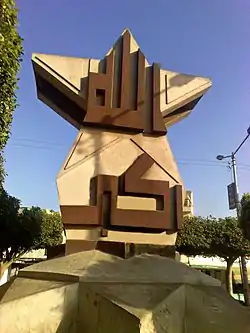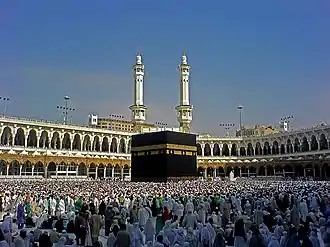Takbir
The Takbir (تَكْبِير, pronounced [tak.biːr], "magnification [of God]")[lower-alpha 1] is the Arabic phrase ʾAllāhu ʾakbaru (ٱللَّٰهُ أَكْبَرُ, pronounced [ʔaɫ.ɫaː.hu ʔak.baru] (![]() listen)), meaning "God is greater"[1] or "God is the greatest".[2][3]
listen)), meaning "God is greater"[1] or "God is the greatest".[2][3]
| Part of a series on |
| God in Islam |
|---|
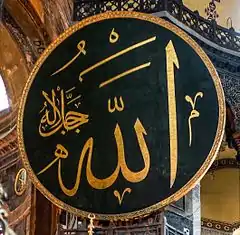 |
|
|
It is a common Islamic Arabic expression, used in various contexts by Muslims; in formal Salah (prayer),[3] in the Adhan (Islamic call to prayer),[4] as an informal expression of faith, in times of distress or joy, or to express resolute determination or defiance.
Exegesis
The Arabic word كَبِير (kabīr) means great from the Semitic root k-b-r. The Arabic word أَكْبَر (ʾakbar) is the elative form (greatest) of the adjective kabīr. When used in the Takbīr it is usually translated as greatest, but some authors translate it as greater.[5][6][7] The term Takbīr itself is the stem II verbal noun of the triliteral root k-b-r, meaning "great", from which akbar "greater" is derived. The form Allāhu is the nominative of Allah, meaning 'God'.[8][9]
Usage in Islamic rituals


This phrase is recited by Muslims in many different situations. For example, when they are very happy, to express approval, to prevent a Muslim from becoming prideful by reminding them that Allah is their source of success, as a battle cry, or during times of extreme stress. The phrase is not found in the Quran, which does not refer to God as akbar, but uses the name al-Kabīr "The Great" or Kabīr "Great", commonly translated as "Most Great" (13:9, 31:30, 22:62, 34:23, 40:12, 4:34).
In prayer
The phrase is said during each stage of both salah (obligatory prayers, performed five times a day), and nafl (supererogatory prayers, performed at will). The Muslim call to prayer (adhan) by the muezzin and to commence prayer (iqama) also contains the phrase.[4]
While there are many short prayers like it, the usage of takbir is more frequent than any other short prayer.[10]
Following births and deaths
The phrase is used after the birth of a child as a means of praising God.[11] It is also part Islamic funeral and burial customs.[12]
During the Eid Festival and the Hajj
During the festival of Eid al-Adha and the days preceding it, Muslims recite the Takbīr. This is particularly the case on the Day of Arafah.[13]
Other social usage
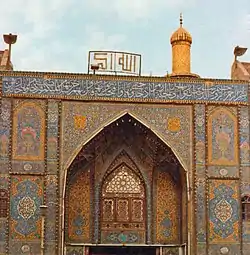
The expression "Allah Akbar" can be used in a variety of situations, from celebrations to times of grief.
In a historical account by someone who was present both at the birth of Abd Allah ibn al-Zubayr and at his funeral, the author observes that "Allahu Akbar" was said on both occasions.[1]
In times of distress
The phrase is sometimes used during distress.
Just before Garuda Indonesia Flight 152 crashed into the jungle near Medan, Indonesia, the pilot screamed "Aaaaaaah! Allāhu akbar" into his radio. According to a radio communication transcript, the pilot's conversation with the air controller had been in English, but his last words were the takbir as the plane crashed on September 26, 1997, killing all 234 people aboard in Indonesia's deadliest crash. It was suspected that the crash may have been due to either disorientation or turbine engine failure caused by local dense smog resulting from forest fires.[15][16]
In times of joy and gratitude
Takbir can be used to express joy or surprise. It is also used as applause in religious contexts, such as after a Quran recital, as other forms of applause are considered less appropriate.[17]
When Reshma Begum was discovered alive 17 days after the 2013 Savar building collapse in Bangladesh which killed 1129 people, crowds jubilantly cried "Allāhu akbar" to express their joy and gratitude that she had survived.[18][19]
As a multi-purpose phrase, it is sometimes used by Arab football commentators as an expression of amazement, or even as a football chant.[20]
In battles
It has been used historically as a battle cry during war.[21] Ibn Ishaq's Life of Mohammed narrates at least two incidents in which the phrase was used.
"When the apostle raided a people he waited until the morning. If he heard a call to prayer' he held back; if he did not hear it he attacked. We came to Khaybar by night, and the apostle passed the night there; and when morning came he did not hear the call to prayer,' so he rode and we rode with him, and I rode behind Abii Talba with my foot touching the apostle's foot. We met the workers of Khaybar coming out in the morning with their spades and baskets. When they saw the apostle and the army they cried, `Muhammad with his force,' and turned tail and fled. The apostle said, 'Allah akbar! Khaybar is destroyed. When we arrive in a people's square it is a bad morning for those who have been warned.'" (page 511) "So he got off his horse and came at him and 'Ali advanced with his shield. `Amr aimed a blow which cut deeply into the shield so that the sword stuck in it and struck his head. But 'Ali gave him a blow on the vein at the base of the neck and he fell to the ground. The dust rose and the apostle heard the cry, 'Allah Akbar' and knew that 'Ali had killed him." (page 456) [22]
Protest
During the Iranian Revolution of 1979, it was shouted from rooftops in Iran during the evenings as a form of protest. This practice returned in the 2009 Iranian presidential election protests,[23][24] which protested the election results.[25]
Usage by extremists
The phrase has sometimes been used as a battle cry by Muslim extremists. This usage has been denounced by other (majority of) Muslims.[20][1]
Professor Khaled A. Beydoun writes that the association of the phrase "Allah Akbar" with terrorism has been exacerbated by mass media and television pundits. He points out that fictional films and shows also utilize it as a cinematic trope further cementing the association.[2]
On flags
The phrase Allāhu akbar is written on the center of the flag of Iraq, 22 times along the borders of the central white stripe on the flag of Iran, and beneath the Shahada in the flag of Afghanistan in white script on the central red background as determined by the 2004 draft constitution.
Iraq
During the Gulf War in January 1991, Saddam Hussein held a meeting with top military commanders, where it was decided to add the words Allāhu akbar (described as the Islamic battle cry)[26] to Iraq's flag to boost his secular regime's religious credentials, casting himself as the leader of an Islamic army.[27][28] Hussein described the flag as "the banner of jihad and monotheism".[29]
In 2004, the US-picked Iraqi Governing Council approved a new flag for Iraq that abandoned symbols of Hussein's regime, such as the words Allāhu akbar.[27][30] In January 2008, however, Iraq's parliament passed a law to change the flag by leaving in the phrase, but changing the calligraphy of the words Allāhu akbar, which had been a copy of Hussein's handwriting, to a Kufic script.[31][32] The Iraqi flag under Hussein had each of the two words of the phrase written in one of the spaces between the stars on the central band; the 2008 flag, while leaving the phrase in, removes the stars.
Iran
The phrase Allāhu akbar is written on the flag of Iran, as called for by Article 18 of the Constitution of the Islamic Republic of Iran.[33] The phrase appears 22 times on the flag.[34]
Afghanistan
The Afghan constitution that came into force on January 4, 2004, required that Allāhu akbar be inscribed on Afghanistan's national flag.[35]
Waziristan
A resistance movement that fought British rule in Waziristan, Pakistan, in the 1930s used a red flag bearing Allāhu akbar in white letters.[36]
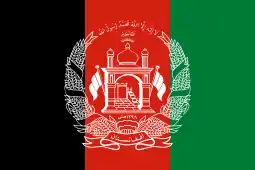 Flag of Afghanistan, with the phrase beneath the Shahada
Flag of Afghanistan, with the phrase beneath the Shahada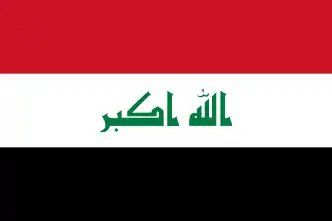 Flag of Iraq, with stylized Kufic script, introduced in 2008
Flag of Iraq, with stylized Kufic script, introduced in 2008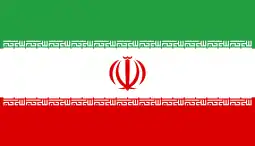 Flag of Iran, introduced in 1980
Flag of Iran, introduced in 1980.svg.png.webp) Flag of 1930s Waziristan (Pakistan) resistance movement
Flag of 1930s Waziristan (Pakistan) resistance movement
See also
Notes
- Also transliterated as Takbīr, Takbiir or Takbeer.
References
- Omar Suleiman. "What 'Allahu Akbar' really means". CNN.
- Khaled Beydoun. "The perils of saying 'Allahu Akbar' in public". Washington Post.
- "The Times of the Five Daily Prayers". Retrieved 23 August 2015.
- Nigosian, S. A. (2004). Islam: Its History, Teaching, and Practices. Indiana: Indiana University Press. p. 102. ISBN 0-253-21627-3.
- E. W. Lane, Arabic English Lexicon, 1893, gives for kabir: "greater, and greatest, in body, or corporeal substance, and in estimation or rank or dignity, and more, or most, advanced in age, older, and oldest" (p. 2587) Archived October 7, 2016, at the Wayback Machine.
- A.O.Green (1887). A Practical Arabic Grammar. Clarendon Press. p. 66.
- "The formula, as the briefest expression of the absolute superiority of the One God, is used in Muslim life in different circumstances, in which the idea of God, His greatness and goodness is suggested." Wensinck, A. J. The Encyclopaedia of Islam, 2nd edition. Brill, 2000. Volume 10, T-U, p. 119, Takbir.
- Böwering, Gerhard, God and His Attributes, Encyclopaedia of the Qurʼān, Brill, 2007.
- Macdonald, D. B. The Encyclopaedia of Islam, 2nd edition. Brill, 1971. Volume 3, H-Iram, p. 1093, Ilah.
- Patrick J. Ryan, S.J. "What I learned from Muslims about God". America.
- "On Birth & School". Archived from the original on 27 August 2013. Retrieved 4 September 2013.
- el-Hibri, Tayeb (19 October 2010). Parable and Politics in Early Islamic History: The Rashidun Caliphs. Columbia University Press. ISBN 9780231521659.
- Rabbani, Faraz. "The Day of 'Arafah: The 9th of Dhu'l Hijjah". Qibla.com. Archived from the original on 15 October 2013. Retrieved 4 September 2013.
- "Arabic Definitions". USA Halal Chamber of Commerce, Inc. Retrieved 5 August 2020.
- "Left-right confusion led to smog air crash". The Independent. London. September 30, 1997. Retrieved May 8, 2011.
- "Business - Indonesian Pilot Was Confused Before Crash - Seattle Times Newspaper". nwsource.com.
- "Allahu akbar: What is the Takbir?". The Week. Cite magazine requires
|magazine=(help) - Andrea, Crossan. "Survivor Found in Collapsed Bangladesh Building After 17 Days". PRI's The World. Retrieved 4 September 2013.
- "Survivor pulled from Bangladesh ruins after 17 days". Global Post. Archived from the original on 28 September 2013. Retrieved 4 September 2013.
- Eric Nagourney. "'Allahu Akbar': An Everyday Phrase, Tarnished by Attacks". New York Times.
- Ludwig W. Adamec, Historical Dictionary of Islam, Scarecrow Press, 2nd ed. 2009, pg. 32
- Life of Mohammed [سيرة رسول الله] by Ibn Ishaq, translated by Alfred Guillaume, Oxford University Press, 1955, 17th printing, Karachi, 2004 https://archive.org/details/TheLifeOfMohammedGuillaume
- Yahoo News Archived June 17, 2009, at the Wayback Machine
- "YouTube". YouTube. June 9, 2009. Retrieved May 8, 2011.
- "How Iran's opposition inverts old slogans". BBC News. December 7, 2009. Retrieved December 21, 2009.
- "New Straits Times". January 15, 1991. Retrieved May 8, 2011.
- "U.S.-picked Iraq leaders approve new flag". USA Today. April 26, 2004. Retrieved February 9, 2010.
- Deroy Murdock. "Murdock, Deroy, "The 9/11 Connection," April 3, 2003". The National Review. Archived from the original on June 17, 2010. Retrieved May 8, 2011.
- Long, Jerry M. (April 2004). Saddam's war of words: politics, religion, and the Iraqi invasion of Kuwait, Jerry Mark Long, University of Texas Press, 2004, ISBN 0-292-70264-7. ISBN 9780292702646. Retrieved February 19, 2014.
- "Rosen, Nir, "Iraq's religious tide cannot be turned back,"". Asia Times. May 26, 2004. Retrieved May 8, 2011.
- Abdul-Zahra, Qassim, "Iraqi Lawmakers Vote to Change Flag," USA Today, January 22, 2008, accessed February 9, 2010 Archived March 5, 2016, at the Wayback Machine
- Abdul, Qassim (February 5, 2008). "Abdul-Zahra, Qassim, "Iraq unveils flag without Saddam's stars"". USA Today. Retrieved May 8, 2011.
- Iran (1980). Constitution of the Islamic Republic of Iran. Mizan Press. ISBN 978-0-933782-02-0.
- Jacoby, Jeff, "Is Israel a Jewish State?", The Boston Globe, November 14, 2007, accessed February 11, 2010 Archived August 8, 2014, at the Wayback Machine
- [ McCarthy, Andrew C., "Cold Comfort on Islam and Apostasy; No one who’s actually read the Afghan constitution should be surprised by the Abdul Rahman case", National Review, March 27, 2006, accessed February 11, 2010]
- "Analysis: A ride on the wild side". UPI. September 19, 2005. Retrieved May 8, 2011.
Books
- Rohi Baalbaki (1995). Al-Mawrid (7th ed.). Beirut: Dar El-Ilm Lilmalayin. ISBN 9953-9023-1-3.
- F. Steingass Ph.D., University of Munich (1870). Persian-English Dictionary, Including the Arabic words and phrases to be met with in literature. Beirut: Librairie Du Liban.
